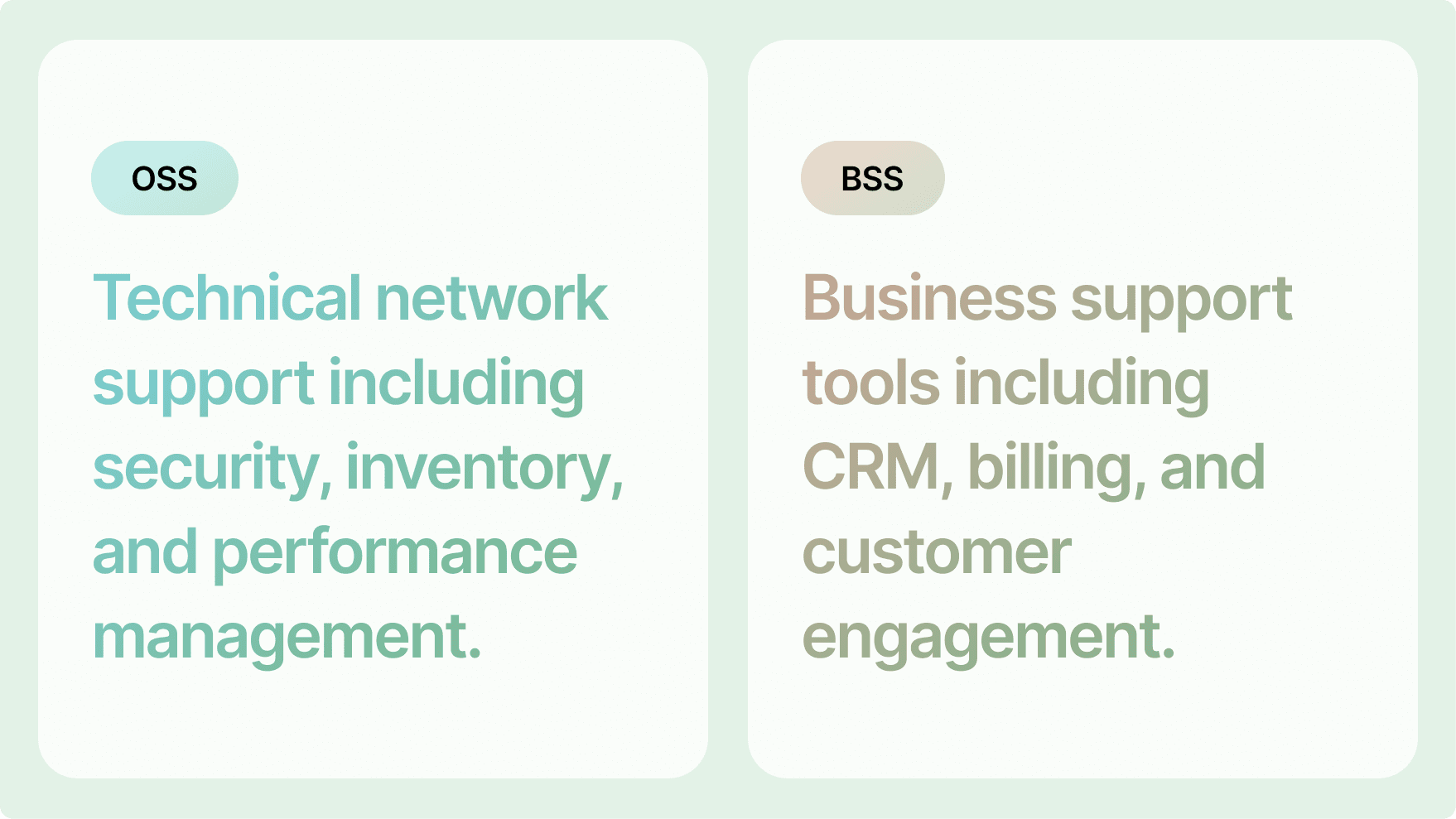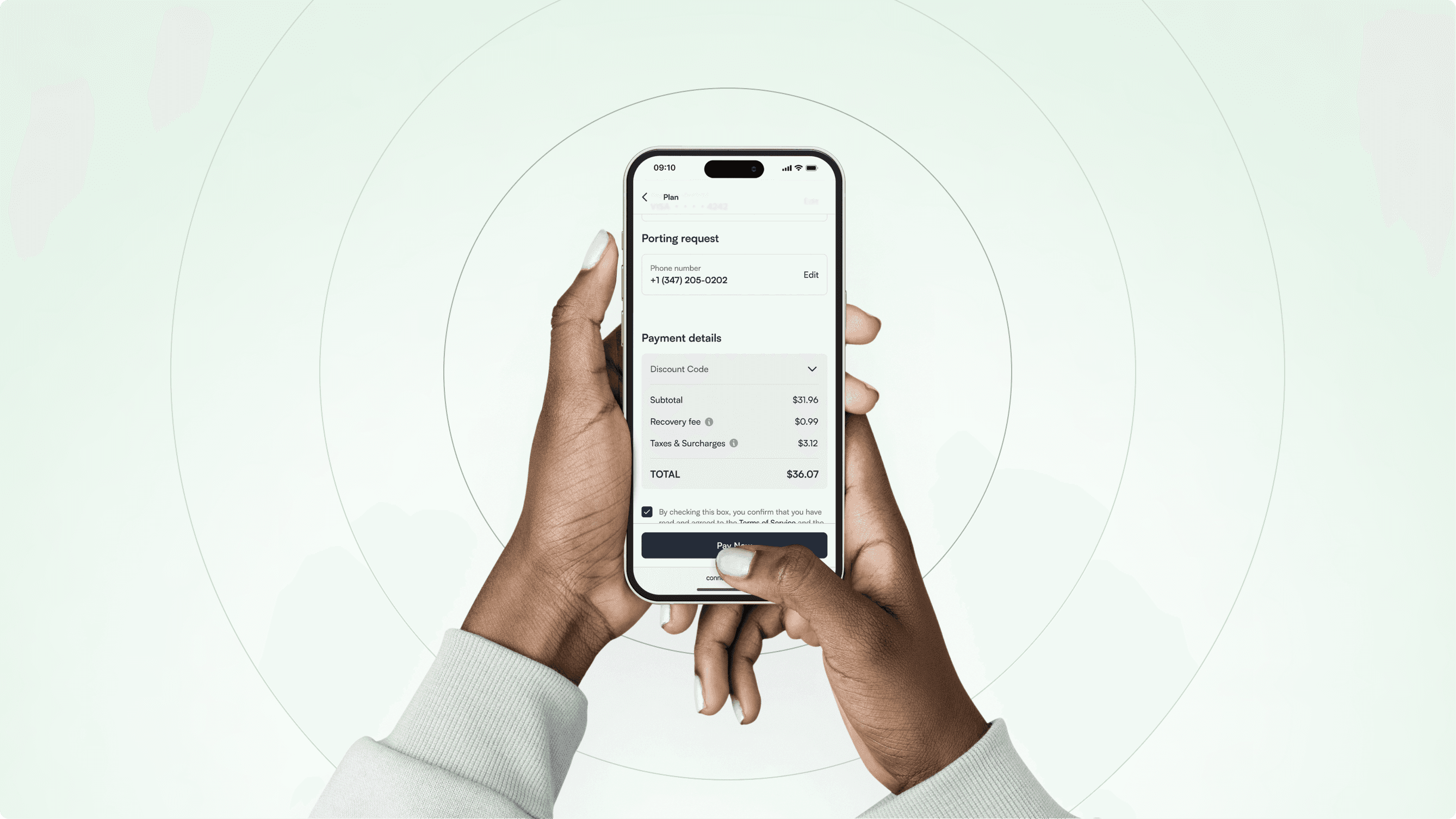In this guide, we’ll explore the role of OSS and BSS in telecom and explain how OSS/BSS enables mobile service providers to bring innovative products to market. We'll also delve into how Gigs is enabling businesses of all shapes and sizes—from tech giants like Nubank to startups like Light—to launch their own mobile services effortlessly.
Let's dive in.
Telecom OSS
In telecom Operational Support Systems (OSS) is an umbrella term for the software mobile service providers use to analyze, manage and monitor their networks. OSS takes care of the operational side of network connectivity.
Services covered by OSS include:
Service activation and configuration: Onboarding customers and ensuring data plans are set up and activated according to their requirements.
Network provisioning: Handling the allocation of resources such as network capacity and bandwidth and dynamically responding to traffic patterns and service requirements to ensure optimal performance and reliability on a network.
Performance management: Collecting network performance data and analyzing network availability in order to improve the quality of the service.
Network inventory: Monitoring the physical infrastructure on which networks are built to ensure problems can be quickly identified and upgrades can be planned and executed smoothly.
Fault management: Detecting and troubleshooting network issues in order to minimize service disruption and downtime.
Network security: Implementing security measures to protect telecom businesses and their customers from data breaches and cyber attacks.
Telecom BSS
BSS in telecom is a collective term for the systems that enable the business and customer-facing side of telecom operations. Services covered by BSS include:
Order management: Activating subscriptions, processing upgrades, downgrades, and cancellations and managing promotional codes and bundles.
Billing: Collecting one-time and recurring payments from users with telecom billing software.
Taxes: Calculating and applying relevant taxes to users' bills.
Regulatory compliance: Capturing and reporting data for regulatory purposes and ensuring telecom companies adhere to industry standards, legal requirements, and licensing agreements.
Customer relationship management: Engaging users with product updates and special offers, managing user accounts, and handling user requests and complaints.
Customer analytics: Providing access to talk, text, and data usage along with customer conversion, renewal and churn metrics.
OSS vs BSS: What's the difference?
An easy way to remember the difference between OSS and BSS in telecom is: OSS provides the maintenance and configuration of network infrastructure, whilst BSS enables the business side of telecom.
If you run an MVNO, your engineers and developers will oversee the OSS whilst your business, marketing, and customer service team will oversee the BSS.

The significance of OSS and BSS in telecom
Together, OSS/BSS helps mobile service providers elevate their customer experience, adhere to security and compliance regulations, and enable growth.
Choosing the right OSS and BSS solution will ensure a smooth onboarding and activation experience and a reliable service for subscribers. It will also set your business up for commercial success by providing frictionless telecom billing software and subscription management, improving customer engagement, and unlocking insights that drive revenue.
Allowing data to flow easily between OSS and BSS is critical from both a customer service and an analytics perspective. If a customer makes an update to their plan, it’s important that the BSS automatically updates the OSS. Likewise, by combining data from both OSS and BSS, it’s possible to identify correlations between things like subscription activity and user satisfaction, and to send timely customer communications based on those trends.
Avoiding operational fragmentation
OSS and BSS providers have historically specialized in targeted solutions, meaning mobile service providers had to work with several telecom partners in order to build out their mobile service. This causes problems, particularly for Mobile Virtual Network Operators (MVNOs), companies that sell mobile services to consumers but do not own the physical network infrastructure.
A lack of standardization within the industry has often led to compatibility issues which required custom solutions that cost MVNOs millions of dollars to build and maintain.
Gigs was designed to solve this problem. As the world's first end-to-end telecom OS, Gigs enables businesses to access everything they need to run a premium mobile service in one place. We cover everything, from wholesale connectivity and service activation, to billing, subscriptions, analytics and more, enabling businesses to launch a wireless service in a matter of weeks.
Rather than working with a series of partners and building and maintaining complex systems to fit each piece of the telecom puzzle together, businesses can work with a single partner and reap the benefits of a fully integrated system where each element can be monitored from one dashboard.
By integrating OSS and BSS capabilities along with additional product offerings, Gigs enables businesses to provide a seamless service to customers, whilst automating processes and optimizing overall operations as they scale.
As a result, we've seen a host of new players enter the telecom market in recent months. From fintech giants like Nubank to innovative startups like Light.
The future of OSS and BSS
Gigs is changing the way new mobile service providers enter the market, enabling tech companies to enter the telecom game with very little friction or overhead.
It’s no longer necessary to be an expert on the complexities of OSS, BSS, tax, and telecom compliance. With the right telecom partner, businesses of all shapes and sizes can launch a fully optimized, modern wireless service effortlessly in a matter of weeks.
New telecom players are not the only ones benefiting from this shift. Established MVNOs are also now able to upgrade legacy infrastructure, streamline operations, and achieve digital transformation without the massive overheads usually associated with major modernization.
With Gigs’, established MVNOs can pick and choose which elements of their service they want to update - whether that’s their telecom CRM, billing software, analytics, or all of the above - and transfer their setup over easily.
As we look towards a future of even greater connectivity, where innovation will further expand the digital economy, it’s crucial that established telecom companies modernize their business operations. Meanwhile, new-joiners to the industry can leverage major advances in technology to offer beautiful, digital-first experiences to customers from Day One.




